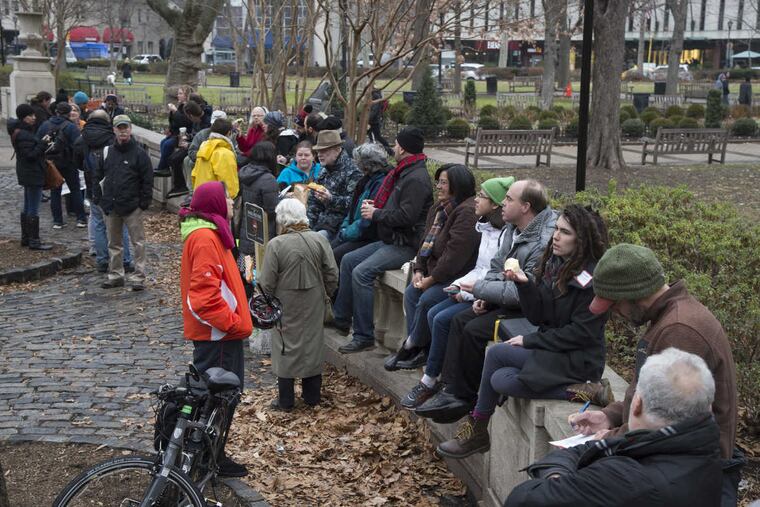City ends ban on wall-sitting in Rittenhouse Square
Philadelphia has ended its ban on wall-sitting in Rittenhouse Square. The city removed signs warning of the ban Tuesday morning, following widespread discontent over the new policy and the same day that about 100 people planned to gather to protest the rule.

Philadelphia has ended its ban on wall-sitting in Rittenhouse Square.
The city removed signs warning of the ban Tuesday morning, following widespread discontent over the new policy and reports the same day that about 100 people planned to gather to protest the rule.
"The mayor felt that while some of the concerns park users had were legitimate, including smoking, that this is an over-correction." said city spokeswoman Lauren Hitt, explaining the about-face.
The decision was applauded by those who turned out for the noon protest at the park.
"People love Rittenhouse, people from around the city, around the world have fond memories here," said Erika Reinhard, who organized the "sittenhouse" protest-turned-celebration Tuesday. "It's really exciting that even though the mayor said government can move slow and things get by you, this was a quick response."
The ban was put in place last week after growing community complaints of unruly and even criminal behavior in what is considered the city's premier public setting.
The Friends of Rittenhouse Square, which works on park upkeep and renovations, had argued the wall-sitting promoted loitering and marijuana smoking.
As soon as the four signs announcing the ban appeared Thursday morning, however, the broad reaction was one of disbelief and anger that the city was outlawing a seemingly harmless act practiced for decades by park-goers.
In response, the city was quick to say there was no penalty for sitting on park walls. The city also said the new rule was unrelated to drug use and behavioral problems, but rather to protect balustrades there that underwent $1 million in renovations.
On Saturday, Kenney weighed in, tweeting: "Sit where you want."
Kenney said he had not been told in advance of the new policy, which was put in place by the city's Parks and Recreation Department.
Managing Director Michael DiBerardinis, who oversees Parks and Recreation, said he also had no notice of the ban.
"I'm not exactly sure how it happened," he said Tuesday. "I'm not quite sure how the decision was made. I do think there was interest in protecting the wall and I think that was the center of the discussion."
Said Hitt: "Normally putting up a sign in a park isn't something that ever rises to the level of being approved by senior administration members."
Once senior city officials learned of the ban and saw the reaction to it, she said, "they pretty much immediately agreed that they needed to be taken down."
Hitt said that there is talk of putting more seating in the park and that people are still encouraged to use benches.
At the park Tuesday, there was still a fair amount of residual anger at the aborted ban.
"We were pretty shocked and more than I expected outraged," said Eva Roben, 25, of South Philadelphia, who attended Tuesday's sit-in. "It felt so ridiculous and out of touch to have those signs, and it felt pretty clear also when they went up that it was an attempt to keep certain types of people out of the park."
Roben joined about 100 people who sat side by side on the walls, eating lunch and chatting.
The police car that had previously been parked in the center of the square was also gone.
Roberta Gross, who lives a block away, walked her dog through the sit-in and expressed an alternative view.
"We use the park extensively and the smoke and the pot -- this area is inundated," she said. "They're targeting the people smoking pot. They're targeting a nuisance. They're not targeting black and white -- seriously, you can get a contact high."
Vicky Bayle, 76, also said she's upset the wall ban is coming to an end.
She said drug dealers and users "hang out here all day and all night and intimidate people."
The shooting of a bicycle messenger who tried to intervene in a robbery in the park in October brought more police to the square, Bayle said.
She said it did little to curb the influx of drug dealers and users, though.
"People with little kids would not walk through there because they were intimidating. They were intimidating to us, using the worst language," she said.
Betsy Wice, 75, lives on the square and doesn't feel intimidated. The retired Philadelphia public schoolteacher said she wanted to retire somewhere she could still experience the real world.
"I didn't want to be divorced from the community," Wice said. "Here I can come down to the square and I see all different types of people. This is the ideal space. There's always that kind of edge about whose park is it. That's what this is about and it's everybody's park, and some people are not comfortable with that."